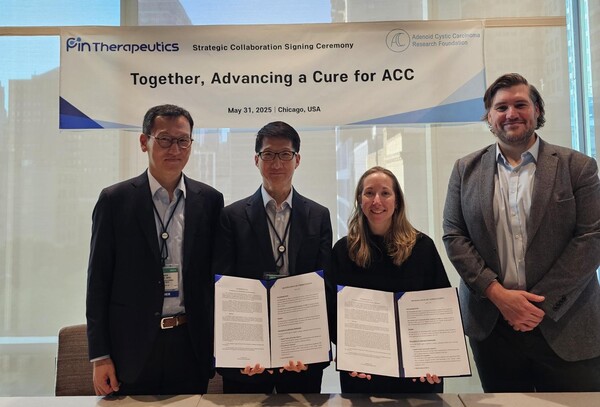
CHICAGO, Ill. – By Hong Sook / Korea Biomedical Review correspondent -- Pin Therapeutics has set about to target rare cancers with proteolytic agents.
Pin Therapeutics, a biopharmaceutical company focused on developing proteolytic agents for the treatment of adenoid cystic carcinoma (ACC), has signed a strategic memorandum of understanding with the Adenoid Cystic Carcinoma Research Foundation (ACCRF), a non-profit research organization in the U.S.
The agreement was signed last Saturday (local time) during the American Society of Clinical Oncology 2025 Annual Meeting (ASCO 2025) in Chicago, USA.
Adenoid cystic carcinoma (ACC) is a rare cancer that develops around the salivary glands and is highly invasive, with a high likelihood of metastasis and recurrence between three and 10 years after initial diagnosis. However, effective treatment options are still limited, and new drugs are not actively being developed due to the rarity of the disease.
To address this research gap, ACCRF has established and operates more than 20 patient-derived xenograft (PDX) models of adenocarcinoma, which reflect its histologic and genetic characteristics.
ACCRF operates the PDX Models & Screening Program based on these models, providing consistent preclinical data to industry and academic researchers. This program is a specialized research platform for adenocarcinoma that enables efficacy validation and mechanism analysis of new drug candidates.
“We are excited to announce our first strategic collaboration with ACCRF during ASCO,” Pin Therapeutics CEO Jo Hyun-sun said. “PIN-5018 demonstrates that proteolytic-based drugs can be a breakthrough for challenging diseases such as adenocarcinoma.”
Pin Therapeutics evaluated the preclinical efficacy of its lead pipeline drug, PIN-5018, through this screening program.
According to the company, preclinical results demonstrated Complete Tumor Regression (CR) in a patient-derived model of an aggressively proliferating form of adenoid cystic carcinoma with oral monotherapy, which was the basis for the agreement.
PIN-5018 is an orally administered CK1α-selective molecular glue degrader (MGD) that received phase 1 IND approval from the U.S. Food and Drug Administration (FDA) last month. The company plans to begin dosing the first patients in Korea for the phase 1a trial later this year.
With the signing of the MOU, the two companies will begin collaborating in earnest, combining their respective expertise. Finn Therapeutics brings proprietary Targeted Protein Degradation (TPD) drug discovery capabilities and translational research. At the same time, ACCRF has a deep biological understanding of adenoid cystic cancer, a clinical research network, and patient community support.
The two sides will use these complementary resources to accelerate clinical studies and develop treatments for adenocarcinoma. They will also focus on jointly exploring and coordinating opportunities for external funding and multi-institutional collaborations to ensure the collaboration's sustainability and scalability.
ACCRF has officially invited Pin Therapeutics to present at the ACCRF Annual Research Conference in Boston, Mass., in September. At the conference, Pin Therapeutics will present preclinical data from PIN-5018.
"This collaboration with Pin Therapeutics is based on scientific evidence and a shared vision and marks a turning point in the development of a new era in the treatment of adenoid cystic cancer," said Jeffrey A. Kaufman, co-founder and executive director of the ACCRF. "The promising preclinical data demonstrating PIN-5018 in the ACC PDX model provide new hope and valuable insights for the global ACC researcher and patient community."
Professor Kang Hyun-seok of the Department of Medical Oncology at UCSF School of Medicine and an expert in head and neck cancers, including adenoid cystic carcinoma, said, "It has been a long-standing belief and goal of mine to identify effective treatments for patients with adenoid cystic carcinoma. I am very pleased that Pin Therapeutics and ACCRF are working together to achieve this goal. I sincerely hope this collaboration will lead to optimal treatment for patients with adenocarcinoma."
Professor Kang has been an advisor to Pin Therapeutics since 2021 and has been actively involved in developing PIN-5018 for the treatment of adenocarcinoma.
Related articles
- [ASCO 2025] What is Hanmi's next-gen onocology development strategy?
- [ASCO 2025] How Lunit is using AI to predict cancer treatment effectiveness
- [ASCO 2025] How do LigaChem's ADCs differ from existing drugs?
- Pin Therapeutics taps AI firm ImpriMed to predict clinical response of blood cancer drug
- J&J backs Prazer’s ₩29 bil. raise as startup targets a 2026 tech transfer in Alzheimer’s
- Pin Therapeutics unveils Ligase 2-driven ‘PinMARS’ vision at US TPD summit

